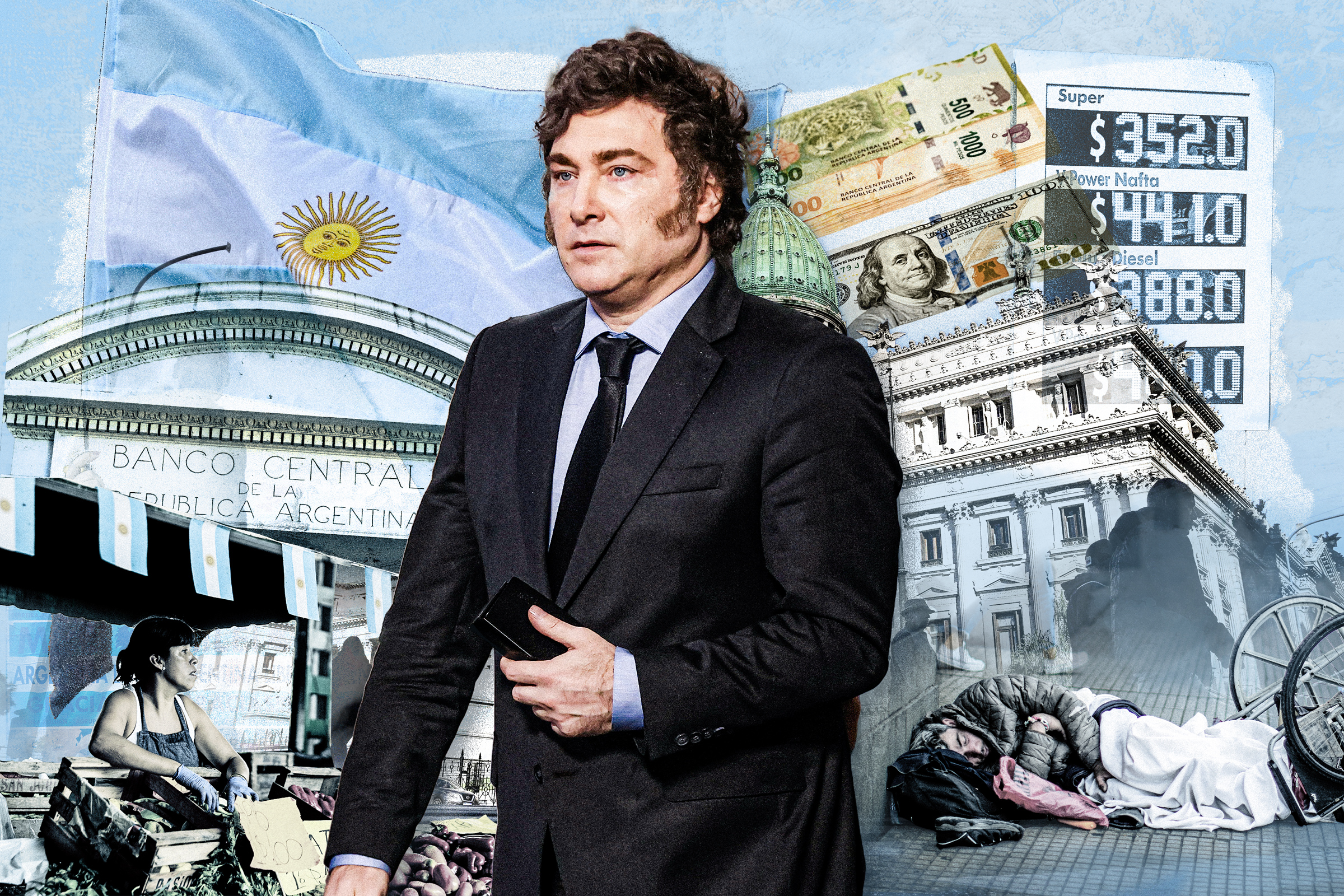- Morning Brief
- Posts
- How Milei’s Radical Reforms Turned Argentina’s Economy Around
How Milei’s Radical Reforms Turned Argentina’s Economy Around
Milei cut 10 government agencies, fired 34,000 public employees, and cut spending by 30 percent—and the Trump transition team is taking notice.

Illustration by The Epoch Times, Getty Images, Shutterstock
On his first anniversary as president of Argentina, Javier Milei announced the initial results of his relentless campaign to cut government spending, eliminate regulations, and pare back the country’s administrative state.
“Today, with pride and hope, I can tell you that we have passed the test of fire,” Milei told Argentinians on Dec. 10. “We are leaving the desert, the recession is over, and the country has finally begun to grow.”
When Milei took office in November 2023, Argentina, once one of the world’s 10 richest countries, was in a dysfunctional state. Having defaulted on its sovereign debt three times since 2001, it was on track to do it again.
Its annual inflation rate was approaching 200 percent, its poverty rate was above 40 percent, its growth rate was negative 1.6 percent, its fiscal deficit was 15 percent of GDP, and it was running a chronic trade deficit.
Argentinians wanted change and voted the self-proclaimed libertarian into office with the largest majority that a presidential candidate has received since free elections were reinstated in 1983, taking 55.7 percent of the vote over his opponent, incumbent economy minister Sergio Massa, who received 44.3 percent.
Over the past year, Milei eliminated 10 of Argentina’s 18 government ministries, capped the salaries of top bureaucrats, and fired 34,000 public employees, cutting government spending by 30 percent.
After the U.S. election in November, Milei was the first foreign leader to meet with Trump, and members of the incoming Trump administration are tracking Milei’s progress.
“A reasonable formula to fix the U.S. government: Milei-style cuts, on steroids,” Vivek Ramaswamy, cohead of the soon-to-be-created Department of Government Efficiency, stated on social media platform X.
Out of the Blocks
Upon taking office, Milei’s administration operated as if it were in a race against time, scrambling to deliver some sign of a brighter future before voters’ patience ran out.
During his first month in office, Milei issued a “mega-decree” that included 366 regulatory reforms, according to a report by Cato Institute political analyst Ian Vásquez and Human Freedom Index coauthor Guillermina Sutter Schneider.
By the end of his first year, that had climbed to 672 regulatory reforms enacted, along with the elimination of 331 regulations and the modification of 341 others.
These included actions such as eliminating import licenses and lifting rent controls. These acts ultimately led to a 35 percent reduction in the price of home appliances and a 20 percent reduction in the cost of clothing, according to the report, as well as a sharp increase in available rental apartments in Buenos Aires that brought a significant drop in rent prices.

Supporters of Argentine President Javier Milei arrive at a stadium for the presentation of his book, in Buenos Aires on May 22, 2024. Gustavo Garello, File/AP Photo
Dismantling a Centralized System
“When Milei took up residence at the Casa Rosada [presidential offices], he faced a daunting task: dismantling Argentina’s illiberal, fascist economic system—a system that has been built up since the 1930s and one in which every activity of individual Argentines is subject to the omnipotent dictates of the state,” Steve Hanke, professor of economics at Johns Hopkins University, said.
The president’s rhetoric and achievements have “put the idea of free markets back on the lips of the chattering classes,” Hanke, formerly an adviser to Argentine President Carlos Menem, told The Epoch Times.
Milei, an economist, author, and former soccer player and rock ‘n’ roll singer, sometimes campaigned with a chainsaw in hand, pledging to slash government bureaucracy in a country that he has said had “embraced socialist ideas for the last 100 years” and was now eager to shake them off.
“Liberalism is a natural form of rebellion against the system,” Milei said in a 2023 interview with Tucker Carlson. One of his campaign slogans was “Viva la libertad” (“Long live freedom”).

Argentina’s extensive system of government control earned it a lowly 159th place out of 165 countries on the Fraser Institute’s 2022 Economic Freedom Index, nestled between Iran and Burma (also known as Myanmar). But Milei’s campaign against socialism concerns more than economic freedom.
“Perhaps most important of all, and beyond economics, Mr. Milei has jump-started a cultural shift away from socialist ideals, championing civil society and principles of liberty and personal responsibility,” Peter Earle, an economist at the American Institute for Economic Research, told The Epoch Times.
His agenda echoes those of former world leaders, including British Prime Minister Margaret Thatcher, who in the 1980s introduced a then-radical program of tax cuts, privatization, and deregulation while reforming the country’s trade unions and health and education systems.
With its sense of urgency, Milei’s program is also reminiscent of the programs of many former Soviet countries in Europe, which rushed to get market-based, democratic structures in place while they dismantled sclerotic, centrally controlled systems.

Presidential candidate Javier Milei of La Libertad Avanza lifts a chainsaw during a campaign rally in Buenos Aires on Sept. 25, 2023. Tomas Cuesta/Getty Images
Devaluing but Keeping the Peso
Milei’s administration also cut fuel subsidies, halted government infrastructure projects, and devalued the peso by half to bring its official exchange rate in line with market exchange rates.
He had proposed eliminating Argentina’s national currency altogether, replacing it with the U.S. dollar. But he has not done this, jeopardizing his fight against inflation, according to some experts.
“Milei’s Achilles’ heel will be the peso,” Hanke said. “Milei won the election because he promised to mothball the central bank and the peso.”
He has failed to do so, while also leaving capital controls in place, Hanke said.
“If Milei would have dollarized as he promised to do ‘on day one,’ inflation would now be dead as a doornail and capital controls would be history,” he said.
Milei has also worked to reorient Argentina’s economy, which he deemed unbalanced, with too much of its GDP coming from government spending and personal consumption, and too little from private investment and exports.
He appears to be succeeding in this, turning the country’s trade deficit into a trade surplus this year. Argentina is rich in commodities such as lithium and copper, which are essential to building electric batteries and transmission lines for electric grids, and has abundant fertile lands for agriculture, according to the World Bank.

Street sweepers and recyclers walk by the Central Bank of Argentina in Buenos Aires on Nov. 30, 2023. During his campaign, Milei promised to take dramatic economic action. Tomas Cuesta/Getty Images
Emerging From Painful Transition
Changes of this magnitude are often painful, as Milei warned that they would be. But signs indicating better days ahead are also emerging.
According to a World Bank report, Argentina’s GDP is estimated to have contracted by 3.5 percent this year “due to the stabilization plan that includes the realignment of relative prices and the elimination of fiscal and external imbalances,” and partly because of severe drought that hit its agricultural industry hard.
Personal consumption rates appear to have fallen as Argentinians, like many Americans, continue to struggle to make ends meet. Beef consumption in Argentina, a country famous for its beef, fell during the first six months of this year to its lowest level in 13 years.
Argentina’s poverty rate increased during Milei’s first six months from 42 percent to 53 percent, the country’s highest level since 2003. It is now trending down, declining to 49 percent in December.
Inflation shot up to 280 percent in April, according to Statista, largely because of the devaluation of the peso. The monthly inflation rate fell from 25 percent a year ago to 2.4 percent in December, with both government and trade balances shifting from deficit to surplus.
Government spending has been cut by almost one-third.
In November, Argentina announced its ninth consecutive month of government budget surpluses. And with inflation below 3 percent monthly, Argentina’s central bank cut interest rates from more than 100 percent a year ago to 36 percent at the end of November.
In September, Argentina’s rate of wage growth, which was 4.7 percent, exceeded the inflation rate for the first time in years, according to Trading Economics.
The World Bank projects that Argentina’s GDP will grow by 5 percent in 2025.
A December Gallup poll found that 41 percent of Argentinians said their economy is getting better, up from 25 percent in 2023, and 53 percent of Argentinians said their standard of living is getting better, the first time that a majority responded positively since 2015.
Still, 35 percent said they continue to struggle to afford food, and 69 percent said they struggle to find work.
Overall, Milei’s reforms have received grudging approval, with 43 percent of Argentinians expressing confidence in his administration. While that is less than half, it is still up significantly from the 24 percent who expressed confidence in his predecessor, President Alberto Fernández. And in some recent polls, Milei’s personal approval rating topped 50 percent.

A homeless man sleeps on Plaza de Mayo square in front of the Casa Rosada presidential palace in Buenos Aires on Sept. 25, 2024. Argentina’s poverty rate increased from 42 percent to 53 percent during Milei’s first six months, the country’s highest level since 2003. Luis Robayo/AFP via Getty Images
Lessons for Trump Administration
Earle said that if the Trump administration wants to take a page out of Milei’s book, it has to hit the ground running, “given the lag times in economic policies.”
“In view of the rapidity with which he has built his Cabinet and begun drawing plans up, it’s quite clear that President Trump has every intention of starting to tear away constricting regulations and wasteful spending on his first day in office,” Earle said.
He said the Trump administration must also be willing to consider cuts in areas such as the military, education, Social Security, and Medicare, and be “immune to the criticism” that will inevitably follow.
The United States is not experiencing many of the crises that Argentina has faced, but many economists predict dire consequences if federal spending continues at the current pace.
The United States ran up more than $8 trillion in federal deficits between 2020 and 2023, and the national debt, which exceeded $36 trillion, is costing Americans $1.8 billion per day in interest payments.
Inflation, which was largely driven by government spending, has been brought down from its peak of more than 9 percent in 2022 to 2.7 percent currently. The recent rise in inflation indicates that it remains a threat and underscores the need to get spending under control.
In his first term, Trump cut taxes and approved trillions of dollars in new government spending, to which President Joe Biden added more trillions of dollars.

Argentine President Javier Milei talks to President-elect Donald Trump at the America First Policy Institute Gala held at Mar-a-Lago in Palm Beach, Fla., on Nov. 14, 2024. Joe Raedle/Getty Images
“If there are tax cuts but no spending cuts, deficits will widen,” Earle said. “The administration and its policies may lose credibility if—after being elected on the basis of being better on economic issues—U.S. debt and deficits, as well as inflation, worsen.”
And Trump may not be as dedicated to free markets as Milei.
While Milei liberalized trade, bringing the cost of many imported essentials down, Trump has threatened numerous tariffs—which some have said would lead to higher prices—with the goal of protecting U.S. industries.